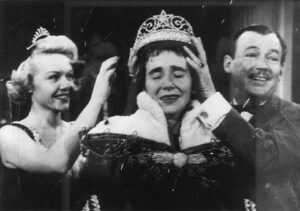By Dan Gifford
First published Breitbart.com
16 June 2010
OK, I walk into the TV room the other night expecting to watch some vintage Eastwood and what do I wind up watching instead? The Real Housewives of New Jersey — aka nouveau riche, high maintenance, goombah psycho bitches — are squaring off.

Their verbal barbs are mean and drawing blood and I can’t change the channel. Not since the meow days of Falcon Crest and Dynasty have I so wanted to see to see manicured claws maul Maybelline. But this feeling seems different somehow, and research on the way reality shows affect viewers appears to confirm that it is.
Are viewers more likely to emulate behavior when the characters on the screen are real people? The answer appears to be ‘yes.’
“Reality programs are the most likely to be imitated” says Sarah Coyne, a Brigham Young University professor of family life and lead author of a study that will appear in the June issue of The Journal of Broadcasting and Electronic Media. She is just one of a number of academics studying the barely examined effects of Reality TV: “I knew the level of aggression was going to be high, but I had no idea it was going to be this high,” says Coyne. “All audiences think it won’t affect them, but we aren’t as immune as we think we are.”
I’m certainly not.
On the tube, Noo Joisey divorced housewife Danielle Staub…

….whom the FBI once arrested for drug running and kidnapping, has crashed a child’s cancer fundraiser with an entourage of wise guy ex cons that includes the New York City chapter president of Hells Angels.

They’re staring the fundraiser people down. Staub threatens to “turn them loose.” Will someone get their face punched? Will someone get whacked? That aside, I’m starting to feel the emotions I felt when looking for trouble long ago even though I’m now too old to act on them.
That may not be true of others.
“Reality television is overtaking the networks and polluting the viewers’ minds with distorted pictures of reality, leaving behind an even bigger effect than that of regular television,” writes Erica Pontius of Missouri Western State University’s Department of Psychology. “These shows appeal to a baser component of human nature, the part that gets pleasure from seeing other people fail,” adds Amber Watts in her book Melancholy, Merit, and Merchandise: The Postwar Audience Participation Show. “What are the repercussions of this,” she asks?
It’s worth noting that one of the shows Watts is referring to is Queen for a Day, the 1950s forerunner, she says, of modern reality TV.

Basically, it was tales of misery for merchandise where the woman who told the most heart-wrenching, weepy story of woe won prize wampum.
Even so, that show contained all the elements that make modern reality TV work and the typical reality fan different from those of fictional shows, according to a study by Psychology Today.
Unrealistic Expectations
Reality TV, as opposed to fictional stories, represents itself as real life, causing many to believe their own lives should be as dramatic as a meeting with Harvey Weinstein.
Desire for Status
“Fans of the shows are much more likely to agree with statements like, ‘Prestige is important to me’ and ‘I am impressed with designer clothes,’ says Psychology Today. Those viewers liked to fantasize about gaining status and fame by just showing up.
Escapism
Always an element in fictional drama, but it’s even more pronounced when viewers see ordinary people leaving their everyday routine to try being America’s Next Top Model or to test their manhood on an Alaskan fishing boat. Deadliest Catch captain Sig Hanson said he’s amazed how many men come North looking for crew work they are clearly unable to handle.
Lack of Privacy
Because of reality TV conditioning, “expectations of privacy have been eroded … Public disclosure, even of formerly private behavior and feelings, is the expectation” says Brad Waite of Central Connecticut State University.
Humiliation
Waite also found a definite desire to view the humiliation of others and says the coding of character behaviors showed reality programs were much higher in humiliation than scripted dramas.
Thatsa’ lotta human frailties, and they’re all about to be served up on one reality show plate as consequences.
Real Housewives of New Jersey star Teresa Giudice and her husband Joe are a false reality.

They cannot afford their gaudy 10,000 square foot mansion, expensive furniture, jewelry and rolls of $100 bills many viewers are probably envious of, according to the New York Post.
The real reality is that they owe 11 million dollars for all that appearance and they can’t pay.
How’s that for a reality bite?
